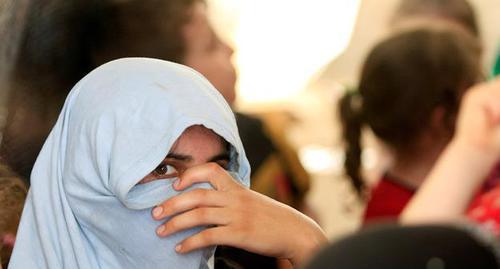
27 June 2020, 19:38
Rights defenders treat situation with women's rights in Northern Caucasus as critical
The traditions and customs of most regions of Northern Caucasus predispose to violence against women in family, while victims of violence are not ready to go to the police, rights defenders have noted.
The "Caucasian Knot" has reported that a message was circulated in social networks that on June 12, in the city of Gudermes, a husband killed his 23-year-old wife. After a resonance in social networks, the Chechen Prosecutor began a check. On June 20, the body of the deceased woman was exhumed; her mother stated that she saw bruises on her daughter's body. But on June 23, during a meeting with Ramzan Kadyrov, she apologized for these words. And Kadyrov urged women to endure beatings from their husbands, thereby demonstrating his ideological tolerance for violence against women.
The deceased woman tried to leave her husband because of beatings, relatives of the deceased assert. Earlier, the woman's mother said that they were trying to fence off her daughter's husband, since he is a military serviceman.
In Northern Caucasus, women are taught not to notice their rights violations since very childhood, said Natalia Voikova, an activist of the "Anna" Violence Prevention Centre. "It's to a different extent, of course: in Kabardino-Balkaria this is easier, in Dagestan it's more complicated. But the traditional upbringing of a girl is generally the same: they must be quiet, obedient, and from childhood get used to the role of a humble wife. Girls grow up into women, who then suffer violence for years, but cannot change anything," Ms Voikova told the "Caucasian Knot".
Domestic violence is an urgent problem not only for Chechnya, but for the entire Northern Caucasus, said Saida Sirazhudinova, the president of the "Kavkaz. World. Development" Centre for Researches of Global Issues of the Modernity and Regional Problems. "The situation with domestic violence has recently worsened everywhere; and the law on decriminalization and the authorities' policies don't contribute to improvement of the situation," Ms Sirazhudinova told the "Caucasian Knot".
Earlier, there were more divorces in Chechnya, as Chechen women were bolder, the rights defender has noted. "Earlier, Chechen women more often became divorce initiators; and their situation was favourably better compared with that in Ingushetia. But here a lot depends on the family and resources of the women themselves. In many cases, they simply have nowhere to go. Awareness of the threat of losing children also stops many. Therefore, even when women anticipate trouble, they are unable to prevent the tragedy," she said.
This article was originally published on the Russian page of 24/7 Internet agency ‘Caucasian Knot’ on June 27, 2020 at 09:52 am MSK. To access the full text of the article, click here.
Source: CK correspondent




